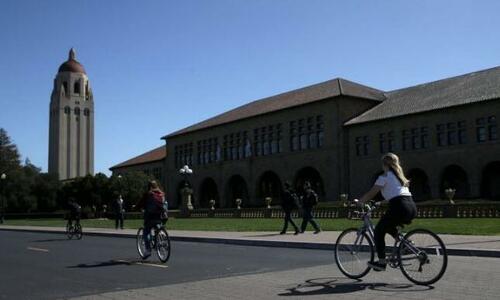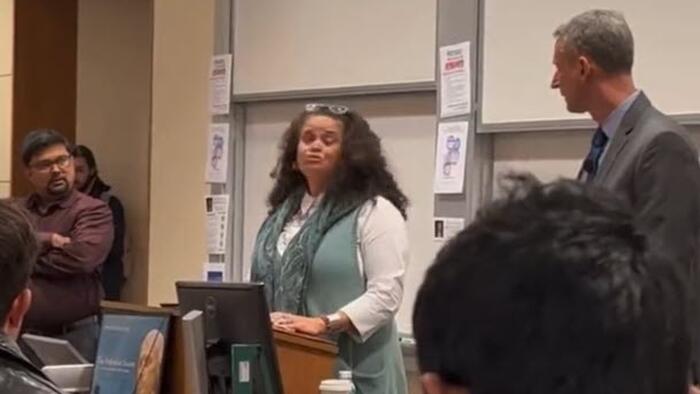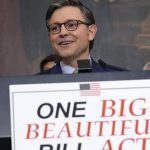Update (1400ET): Last night, Stanford President Marc Tessier-Lavigne and Law School Dean Jenny Martinez issued a joint apology that is commendable in its words of regret, but conspicuous in its failure to promise any action against those who shutdown this event. As Jonathan Turley explains, it is like expressing regret over the sinking of the Titanic without addressing the design flaw.
To paraphrase Steinbach, there will be no “squeeze” coming from Stanford on the denial of free speech.
Of course, the letter also does not address the environment of intolerance at Stanford or the loss of diversity of viewpoints. The intolerance is reflected in the overwhelmingly Democratic and liberal makeup of faculties. A new survey of 65 departments in various states found that 33 do not have a single registered Republican. For these departments, the systemic elimination of Republican faculty has finally reached zero, but there is still little recognition of the crushing bias reflected in these numbers. Others, as discussed below, have defended the elimination of conservative or Republican faculty as entirely justified and commendable. Overall, registered Democrats outnumbered registered Republicans by a margin of over 10-1.
The survey found 61 Republican professors across 65 departments at seven universities while it also found 667 professors identified as Democrats based on their political party registration or voting history.
That is why I am less than impressed by this letter. After all, Dean Martinez’s first response was to make excuses for her DEI dean. Martinez explained that Steinbach’s condemnation of the judge for trying to speak publicly was a “well-intentioned” “attempt[] at managing the room” that just “went awry.”
Much has gone “awry” in higher education but it is not a question of managing a room but managing free speech.
* * *
As we detailed earlier, Federal Judge Kyle Duncan has called on Stanford University to fire the Diversity, Equity, and Inclusion Dean who participated in a student-led revolt against his appearance at the law school.
Judge Duncan appeared at Stanford Law to speak at an event hosted by the Federalist Society chapter on campus.
The event quickly turned sour after protestors heckled him, accusing him of transphobia and suppressing black voters.
After the video and story went viral, Federal Judge Kyle Duncan said he was treated like “dogshit” during his visit…
“Don’t feel sorry for me. I’m a life-tenured federal judge. What outrages me is that these kids are being treated like dogshit by fellow students and administrators.”
…and requested that Stanford Law terminate the administrator that disrupted him, according to an interview in the Washington Free Beacon, adding that he was concerned that:
“If enough of these kids get into the legal profession, the rule of law will descend into barbarism.”

As Jonathan Turley detailed in a note yesterday, it was a chilling reminder of the anti-free speech movement sweeping across our universities, including our law schools.
For years, free speech has been in a free fall on our campuses. Many faculty have virtually purged conservatives and libertarians from their ranks in what has become an academic echo chamber. It is common for conservative speakers to be blocked or canceled with the support of professors and students alike.
Yet, what occurred at Stanford this week shocked even those of us who have challenged this orthodoxy for years.
The Stanford Federalist Society invited Judge Stuart Kyle Duncan of the United States Court of Appeals for the Fifth Circuit to speak on campus. It is a great opportunity to hear the views of one of the highest ranked judicial officers in the country. Some students also are likely to apply to Duncan for prestigious clerkships so this was an opportunity to make an important connection.
However, liberal students decided that allowing a conservative judge to speak on campus is intolerable and set about to “deplatform” him by shouting him down. It was reminiscent of an equally disgraceful event at Yale Law School when another conservative speaker was similarly canceled — the law students then objected to the fact that campus police were present.
In this event, Duncan was planning to speak on the topic: “The Fifth Circuit in Conversation with the Supreme Court: Covid, Guns, and Twitter.”
A video shows that the students prevented Duncan from speaking and the judge asked for an administrator to be called in to allow the event to proceed.
Dean Steinbach then took the stage and, instead of demanding that the students allow for the event to proceed, Steinback launched into a babbling attack on the judge for seeking to be heard despite such objections.
Stanford Law students shouted down Fifth Circuit appellate judge Kyle Duncan while he was trying to speak.
When he asked for an administrator to control the situation, Stanford’s “associate dean of diversity, equity, and inclusion” got up and lectured him for nearly 10 minutes pic.twitter.com/tjlUPOIMmQ
— Washington Free Beacon (@FreeBeacon) March 11, 2023
Steinbach explained:
“I had to write something down because I am so uncomfortable up here. And I don’t say that for sympathy, I just say that I am deeply, deeply uncomfortable.”
One would expect that the next line would be a condemnation of those who refuse to let opposing views to be heard in the law school. Instead, it turns out that it was the free speech itself that was so stressful and painful for the law dean.
Steinbach declared:
“It’s uncomfortable to say that for many people here, your work has caused harm.”
After a perfunctory nod to free speech…
“I’m also uncomfortable because it is my job to say: You are invited into this space. You are absolutely welcome in this space. In this space where people learn and, again, live. I really do, wholeheartedly welcome you. Because me and many people in this administration do absolutely believe in free speech.
We believe that it is necessary.
We believe that the way to address speech that feels abhorrent, that feels harmful, that literally denies the humanity of people, that one way to do that is with more speech and not less. And not to shut you down or censor you or censor the student group that invited you here. That is hard. That is uncomfortable. And that is a policy and a principle that I think is worthy of defending, even in this time. Even in this time. “
Steinbach proceeded to eviscerate it to the delight of the law students:
“And again I still ask: Is the juice worth the squeeze?”
“Is it worth the pain that this causes, the division that this causes? Do you have something so incredibly important to say about Twitter and guns and Covid that that is worth this impact on the division of these people.”
It is a familiar argument for many of us in higher education.
Duncan’s non-plussed response was simple:
“What does that mean? I don’t understand…”
Judge Duncan was right to be confused. A law school dean was legitimating an attack on free speech and supporting the claim that hearing an opposing legal views on issues like the Second Amendment was harmful to students.
Free speech is now often portrayed as harmful and threatening to the safety of the community. Steinbach suggested that it was Judge Duncan who should be ashamed in trying to speak when others object to his views, including clearly herself.
Dean Steinbach then encouraged people who opposed Duncan to walk out in protest. Many did. That was not a problem. The problem was coming to the event to disrupt it. What is critical is that Steinbach was asked to step forward as an administrator to speak for the law school, not another protester.
The response to Steinbach’s shameful intervention was also all too familiar. MSNBC regular Elie Mystal defended the law students in preventing the judge from speaking. He called it conservative “victimization” and whining simply because the students are expressing themselves.
Mystal is the “justice correspondent” for the Nation Magazine and writes for Above the Law, a prominent anti-free speech site. He is known for racist attacks on black conservatives and has called the Constitution “trash.”
Despite his inflammatory history, I would be the first to oppose conservatives shouting down Mystal or preventing him from speaking.
Yet, liberals insist that preventing others from speaking is an exercise of free speech.
Cancel campaigns are now a common occurrence in schools ranging from Yale to Northwestern to Georgetown. Blocking others from speaking is not the exercise of free speech. It is the very antithesis of free speech. Nevertheless, faculty have supported such claims. CUNY Law Dean Mary Lu Bilek showed how far this trend has gone. When conservative law professor Josh Blackman was stopped from speaking about “the importance of free speech,” Bilek insisted that disrupting the speech on free speech was free speech. (Bilek later cancelled herself and resigned). Even student newspapers have declared opposing speech to be outside of the protections of free speech. At University of California- Santa Barbara, professors actually rallied around a professor who physically assaulted pro-life advocates and tore down their display.
Stanford must now decide whether the “juice” of free speech is worth the “squeeze” of the mob. That distasteful juice mocked by Steinbach is the very thing that defines and sustains higher education.
Loading…











